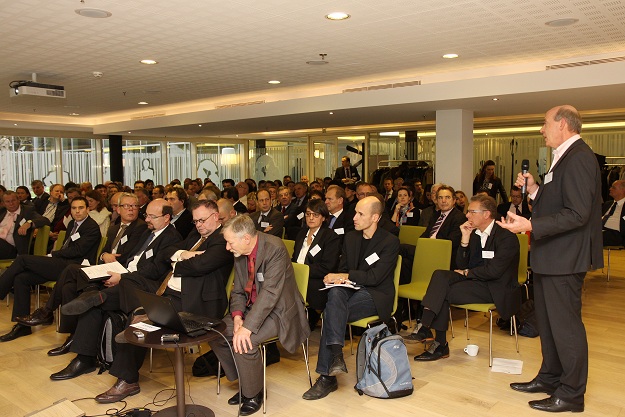Freight Forwarders Forum calls for more balance in security and trade facilitation

A need to strike a careful balance between effectively fighting crime and terrorism while facilitating trade, was among the conclusions drawn from the panel discussions at the first Freight Forwarders Forum organised by CLECAT in Brussels yesterday.
CLECAT welcomed the call of Mr Henrik Hololei, Head of Cabinet of Vice-President Siim Kallas, to help the Commission to identify what the Commission can do to improve and strengthen security EU-wide. Mr Hololei said: “We all know there is no such thing as 100% security. But to impose rules that are too costly and bureaucratic causes inconvenience to passengers and extra cost to business. They end up paralysing transport. Any rules that are made must be proportionate: we need to balance the security risk with facilitating smooth transport flows. There is no need for layer upon layer of checks and associated costs, or unnecessary duplication of the rules.”
Mark Huybrechts, CLECAT president, welcomed the Commission’s recent paper on Transport Security noting that “CLECAT is pleased to see that the need to target crime has been addressed much more prominently and on equal footing with the threat of terrorism. CLECAT believes the Commission has rightfully decided to create an Advisory Committee on Land Transport Security with a corresponding industry body to feed into the discussions and looks forward to contribute with a holistic view on supply chain security that encompasses the whole supply chain and all modes of transport. At the same time, CLECAT encourages more cooperation at European level in the area of judicial and police work, where we see the value in developing best practices and voluntary standards.“

In the first panel debate European Commission officials, shippers and operators vented their concern and frustration at the increased number of criminal acts in road freight transport. The theft of products and cargo moving in supply chains in Europe costs businesses in excess of € 8.2 billion a year. The threat from organized criminals is increasing and becoming more violent. There was an agreement on the need for further initiatives to address this growing concern. At the same time industry is not in favour of new stringent rulemaking coming out of the EU as industry benefits from operating in a Single Market. Paul Linders from CEVA called for common sense and awareness to prevail but equally on the industry to adopt (TAPA) standards which have proven to be successful to reduce criminal acts.
The following debate discussed the much awaited recently published EU Air Cargo Regulation which augments the EU air cargo aviation security framework established by Commission Regulation (EU) no 185/2010. This will require that designated air carriers, or ACC3s, ensure that an on-site verification of its cargo and mail operations at relevant non-EU airports has been carried out by an independent validator. If these air carriers want to make use of a secure supply chain, then entities such as shippers and freight forwarders with whom they do business must be independently validated as well. Those entities may be validated as part of the carrier’s validation, but also independent from the carrier.
Air cargo supply chain industry representatives had a constructive debate on the new EU regulation on air cargo security, as well as the US efforts to mitigate the risks from terrorism (and here especially the ACAS pilot). Whereas CLECAT has identified outstanding questions on resources to administer the schemes and police the new scheme, there was consensus on the need to have harmonised standards built on mutual recognition and the need for simplification of rules at the operating level to ensure efficiencies and enhanced security.
This was echoed by Mr Huybrechts who called for ‘more mutual recognition agreements in the future which are much needed by the industry to ease the burden of applying different laws when you operate global supply chains.’
The last session discussed the need to secure the supply chain through risk management. Panel members discussed whether it was possible to reconcile information management for security and safety risk analysis purposes with trade facilitation. It was argued that proper information control along the supply chain serves logistics as much as it serves safety and security. The challenge for the future is to make the entire supply chain fully transparent, in spite of its complexity and international character. It was noted that the eventual constraints are foremost of commercial and political, rather than in principle a technical nature. The technical challenge, however, is huge when you look at the European customs environment today, with 27 different Member States and 27 national IT systems.
It was concluded that despite many security shortcomings and a degree of risk and the unfortunate presence of crime, still the vast majority of the supply chains are carried by compliant logistics processes that successfully manage to keep things moving.
Presentations will be available soon on the CLECAT website. Also find here the position of CLECAT in response to the Commission Staff Working Document (CSWD) on Transport Security.